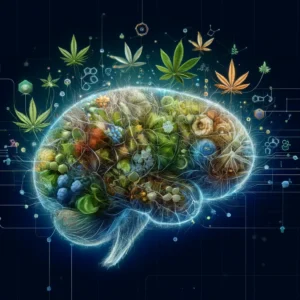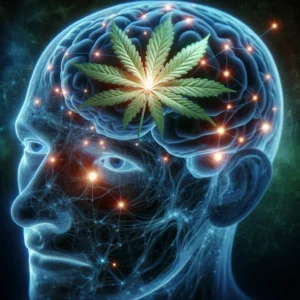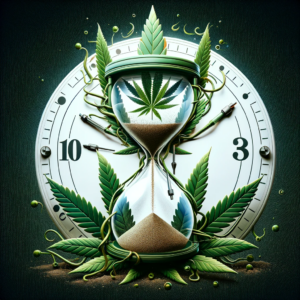Unpacking the Controversy: Is Cannabis Addictive?
 The question of cannabis addiction is a complex one. In recent years, there has been a surge in public dialogue about the addictive nature of cannabis, spurred on by shifting legal landscapes and initiatives. From educational campaigns to the stances of medical professionals, the topic is as controversial as it is crucial. This blog post dives into the nuanced discourse surrounding cannabis and its potential for addiction.
The question of cannabis addiction is a complex one. In recent years, there has been a surge in public dialogue about the addictive nature of cannabis, spurred on by shifting legal landscapes and initiatives. From educational campaigns to the stances of medical professionals, the topic is as controversial as it is crucial. This blog post dives into the nuanced discourse surrounding cannabis and its potential for addiction.
Frequency of Use: Understanding the Risks
The link between the frequency of cannabis use and the likelihood of addiction is well established. Recurring, heavy use of cannabis can lead to a form of dependency known as Cannabis Use Disorder (CUD), characterized by the compulsion to use marijuana, even when it creates significant problems in a person’s life.
How often someone consumes cannabis can significantly increase the probability of forming a dependency. Regular daily or near-daily use has been associated with higher rates of CUD. For those who engage in heavy use, the risk of addiction significantly increases, with cannabis often becoming a central aspect of a person’s life.
Age of First Use: A Window of Vulnerability
The age at which an individual begins using cannabis is crucial to understanding their risk of addiction. Evidence suggests that starting cannabis use during adolescence, when the brain’s reward system and network are still under development, can lead to a heightened susceptibility to addiction. Early onset use of cannabis perturbs the natural maturation process, potentially altering the brain’s neurochemistry and increasing the likelihood of dependency.
Potency of Cannabis: A Tug of War with THC
The cannabis of today is not the cannabis of yesteryear. The rising potency of THC in many strains has altered the landscape of addiction potential. Tetrahydrocannabinol, or THC, is the primary psychoactive component responsible for the “high” from cannabis. Higher THC levels have been implicated in a host of issues, including addiction.
Potent strains can lead to stronger cravings and potentially faster development of a tolerance, leading users to consume more to achieve the desired effects, thereby accelerating the cycle of dependency. The importance of understanding the THC content in the cannabis being consumed cannot be overstated when discussing addiction risk.
Personal Factors: The Role of Genetics and More
Individual susceptibility to cannabis addiction is multifaceted. Genetics, mental health status, and co-occurring substance use disorders can play integral roles in determining one’s risk for developing a dependency. Studies have shown that genetic factors can account for a significant proportion of the risk for cannabis use disorders.
Additionally, those who suffer from conditions like depression or anxiety may turn to cannabis as a form of self-medication, inadvertently increasing their risk of dependency. Furthermore, people who have developed addictions to other substances could be more likely to form a cannabis addiction as well, thanks to the generalizing nature of addiction itself.
The Spectrum of Use: From Casual to Compulsive
It’s important to recognize that not everyone who uses cannabis will become addicted. Many individuals can engage in casual, responsible use without crossing the threshold into dependency. For them, cannabis is an occasional indulgence, akin to a glass of wine or a celebratory cigar.
However, a significant portion of cannabis users will experience issues related to dependency. This can take the form of increased tolerance, withdrawal symptoms, spending inordinate amounts of time obtaining and using cannabis, and using it to prevent or relieve withdrawal symptoms, to name a few.
Cannabis Use Disorder (CUD): Recognizing the Signs
Cannabis Use Disorder is a diagnosable condition in the Diagnostic and Statistical Manual of Mental Disorders (DSM-5), reflecting the consensus that issues related to cannabis dependency occur on a spectrum from mild to severe. Symptoms include cravings, difficulties controlling use, increased tolerance, and withdrawal. Those who find their cannabis use is interfering with their ability to function or enjoy life outside of its use should take heed.
Recognizing the signs of CUD is critical. This disorder can profoundly impact one’s personal, professional, and social life, necessitating professional treatment to overcome. The good news is that, like other forms of addiction, CUD is treatable. However, the first step to recovery is acknowledging the presence of a problem.
Cannabis and the Brain: A Look Inside
The interaction between cannabis and the brain is central to understanding its addictive potential. The brain is equipped with an endocannabinoid system, a network of receptors that cannabis interacts with to produce its psychoactive effects. This system modulates a variety of processes, including pleasure, mood, and cognition—many of which are implicated in the process of addiction.
Long-term, heavy use of cannabis can interfere with the endocannabinoid system, potentially leading to a dysregulation of these essential processes. This could explain why some users find it difficult to quit or reduce their cannabis intake, despite its negative ramifications on their life.
Discussing Dependency: Breaking Down Stigma
For too long, discussions of substance addiction have been laced with stigma. The case of cannabis is no different. It’s crucial to approach the topic of cannabis addiction with the same compassion and understanding that we afford to those affected by other forms of substance dependence. It’s not about willpower or personal failing; addiction is a complex interplay of genetic, environmental, and behavioral factors.
Breaking down this stigma can pave the way for improved education, prevention efforts, and access to effective treatment. By fostering an environment where individuals feel safe to openly address their relationship with cannabis, we can support those who are at risk or already affected by CUD.
Navigating the Relationship with Cannabis
Is cannabis addictive? The answer lies in the multifaceted nature of addiction itself. While it’s clear that cannabis can lead to dependency, the vast majority of users will not develop an addiction. By being informed about the risks, recognizing problematic patterns of use, and fostering open, non-judgmental conversations, individuals can enjoy the potential benefits of cannabis in a safe, responsible manner.
If you or someone you know is struggling with cannabis dependency, reaching out for help is the first step towards recovery. With a supportive community and access to evidence-based treatments, individuals can overcome their addiction and reclaim their lives. By promoting a culture of understanding and care, we can ensure that conversations about cannabis and addiction lead to positive outcomes for all involved.









